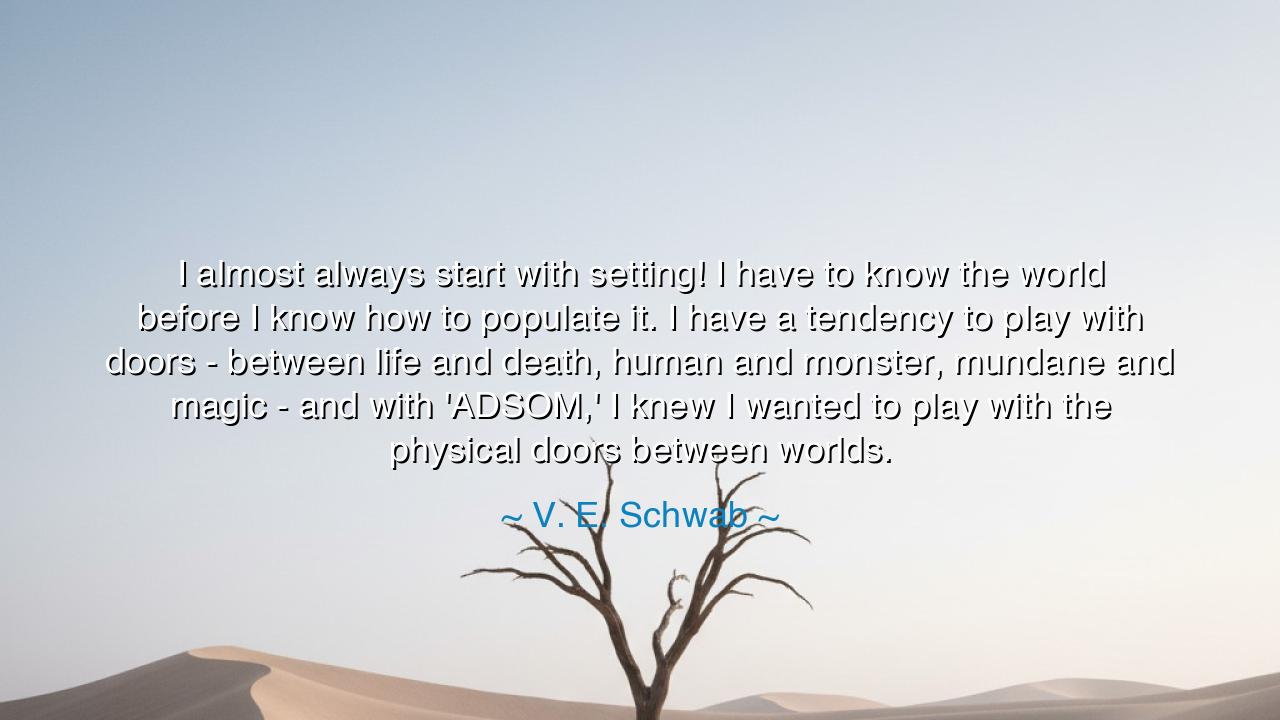
I almost always start with setting! I have to know the world
I almost always start with setting! I have to know the world before I know how to populate it. I have a tendency to play with doors - between life and death, human and monster, mundane and magic - and with 'ADSOM,' I knew I wanted to play with the physical doors between worlds.






In the words of V. E. Schwab, “I almost always start with setting! I have to know the world before I know how to populate it. I have a tendency to play with doors—between life and death, human and monster, mundane and magic—and with ADSOM, I knew I wanted to play with the physical doors between worlds,” we find a meditation on the nature of creation, imagination, and balance. Though she speaks of storytelling, her words reach far beyond the craft of fiction. They touch the ancient truth that every act of creation—whether of worlds, lives, or destinies—must begin with foundation, with the ground upon which all else stands. To know the world before the people is to understand that context shapes soul, that no being can exist apart from the realm that births it.
The meaning of Schwab’s words begins with the idea of setting as genesis. In her work, the world is not merely a stage, but the first breath of creation, the living soil from which character and conflict grow. The ancients too knew this truth: before gods shaped humankind, they shaped the heavens, the seas, the firmament—the order of things. From chaos came cosmos, from void came structure. So too does Schwab create her universes—first the rhythm of the world, then the beings who move within it. Her process mirrors the ancient art of mythmaking, where the universe itself was sacred text, and every creature a reflection of the greater design that contained it.
She speaks, too, of doors—thresholds between opposites: life and death, human and monster, mundane and magic. These are the eternal boundaries of existence, the veils through which we pass in both story and spirit. To play with doors is to acknowledge that reality is not a single realm, but many; that every soul walks between the seen and unseen, between the outer world and the inner one. In her tale A Darker Shade of Magic (ADSOM), these doors become literal—gateways between parallel Londons—but the wisdom beneath them is universal. For who among us has not stood before a door of change, hesitating between the world we know and the mystery beyond?
The ancients often spoke of such thresholds. When Orpheus descended into the underworld to reclaim his beloved Eurydice, he too crossed the door between life and death. When Dante in his Divine Comedy entered the gate of Hell, he stepped into the unknown to seek enlightenment. These stories endure because they remind us that to open a door is both an act of courage and an act of faith. The hero does not know what awaits beyond, yet still they turn the handle. So too does the artist, standing before a blank page, open the door to a world not yet born. In that act, Schwab’s words echo the eternal pattern: creation begins with crossing.
But there is also wisdom in her careful balance—between human and monster, mundane and magic. The ancients taught that within every human heart lies both beast and divinity. The hero’s journey is not to deny either, but to reconcile them—to walk the line between shadow and light without losing one’s humanity. Schwab’s fascination with these oppositions reflects this same ancient truth: that growth, art, and meaning are born from tension, not comfort. The door between worlds is not only physical—it is symbolic of the boundary between what we are and what we might become.
To know the world before knowing its people is to approach life itself with reverence. It reminds us to understand the forces that shape our souls—the families, lands, histories, and struggles that make us who we are. Just as Schwab builds her stories upon the bones of her imagined worlds, so must we build our lives upon the understanding of the world around us. A person who knows their world deeply will act with wisdom and empathy; a person who ignores it will wander aimlessly, lost between doors of their own making.
So, dear listener, let this be the lesson you carry forward: before you create, understand; before you act, observe; before you judge, learn the world in which others live. Do not fear the doors between things—the shifts between the known and the mysterious—for it is through those doors that transformation occurs. Whether in art, in love, or in life, the courage to explore the spaces between worlds is the mark of the seeker, the dreamer, the creator.
And when you stand before your own threshold—when the familiar world begins to fade and another calls to you—remember the teaching of V. E. Schwab: creation begins not with certainty, but with curiosity. Open the door. Step through. Know the world, and in knowing it, you will come to know yourself.






AAdministratorAdministrator
Welcome, honored guests. Please leave a comment, we will respond soon